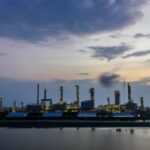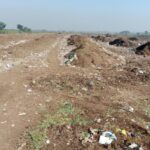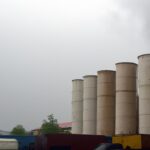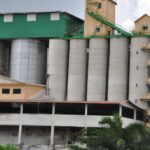Industrialization, the process of transforming a society from agrarian to industrial, revolutionizes economies and societies. It entails the mechanization of production, leading to increased efficiency and output. With the invention of steam-powered machinery, the manufacturing sector experiences rapid growth. Factories emerge, resembling beehives of activity, buzzing with energy and anticipation. The air becomes thick with the scent of burning coal and the rhythmic clanging of machinery. Skilled artisans give way to a new workforce, comprised of laborers seeking employment and a better future. Although industrialization brings prosperity, it also births challenges such as poor working conditions and social inequalities. Society grapples with the consequences of progress, striving for a balance between productivity and humanity.
Table of Contents
- Causes of industrialization
- Environmental consequences of industrialization
- Impact of industrialization on society
- Role of government in industrialization
- Technological advancements in industrialization
(The Industrial Revolution (18-19th Century))
Industrialization transformed society, ushering in a new era of progress and innovation. It brought forth a wave of technological advancements that revolutionized the way we live and work. Factories emerged, humming with the rhythmic churning of machinery, as skilled artisans were replaced by the efficiency of assembly lines. The once serene countryside gave way to sprawling towns and cities, buzzing with activity.
With the rise of industrialization, the world witnessed the birth of modern conveniences. Electricity brought light to homes after nightfall, freeing people from the constraints of daylight. Steam-powered trains sliced through the landscape, connecting distant towns and fostering trade and travel. The printing press, a marvel of its time, spread knowledge like wildfire, granting access to information previously confined to the elite.
However, this rapid progress came at a cost. The embrace of industrialization led to the rise of pollution, as chimneys belched out thick clouds of smoke that tainted the sky. The toll on the environment was undeniable, as pristine rivers turned murky and forests dwindled. The working conditions in factories were often harsh and dangerous, with long hours and meager pay, leaving workers little respite from their toil.
Still, industrialization brought undeniable progress and improved the standard of living for many. It paved the way for mass production, making goods more accessible and affordable. It created jobs, luring people from rural areas to seek employment in burgeoning urban centers. It propelled nations forward, enabling them to assert their influence globally.
Industrialization, with all its achievements and setbacks, forever altered the course of human history. It reshaped economies, societies, and even individuals, leaving an indelible mark on the world we inhabit today. As we navigate the complex challenges of the present, it is crucial to learn from the lessons of the past, harnessing the power of industrialization for the collective benefit of humanity.
Causes of industrialization
Industrialization, the process of transforming an agrarian society into one driven by industry and manufacturing, can be attributed to several key causes. One major factor behind the rise of industrialization was the development of new technologies. Innovations such as the steam engine, mechanized spinning jenny, and power loom revolutionized production methods, enabling goods to be manufactured on a much larger scale.
Another important catalyst for industrialization was the availability of raw materials. The abundance of coal, iron ore, and other natural resources provided the necessary inputs for the manufacturing process. These resources were often discovered in close proximity to each other, allowing for the creation of industrial centers that could capitalize on their combined wealth of raw materials.
Labor supply also played a critical role in the industrialization process. The shift from an agrarian society to an urbanized one created a surplus of workers, many of whom were seeking employment opportunities in the emerging factories. As rural populations migrated to urban centers looking for work, the demand for labor increased, further fueling the growth of industrialization.
Additionally, economic factors such as trade and investment played a significant role in driving industrialization. The expansion of global markets created opportunities for manufacturers to export their products and generate profits. Increased investment in industrial infrastructure, such as factories and transportation systems, also contributed to the rapid growth of industrialization.
Political factors, such as government policies and regulations, also influenced the pace and scale of industrialization. In some cases, governments actively supported industrial development by providing incentives, establishing trade policies, and investing in infrastructure. Conversely, in other instances, political instability or resistance to change hindered the process of industrialization.
Overall, the causes of industrialization are multifaceted and interconnected. The development of new technologies, availability of raw materials, abundant labor supply, economic factors, and political support all played significant roles in driving this transformative process. By understanding these underlying causes, we can gain a deeper appreciation for how and why industrialization occurred, shaping the world as we know it today.
Environmental consequences of industrialization
Industrialization has brought numerous benefits to society. However, it has also resulted in severe environmental consequences. The continuous growth of industries has led to pollution of air, water, and soil. Factories emit harmful gases and substances, contributing to the deterioration of air quality. This pollution not only affects human health but also has detrimental effects on the ecosystem and wildlife.
Industrial activities produce vast amounts of waste that are often disposed of improperly. Chemicals and toxins seep into rivers and lakes, polluting water sources. This contamination harms aquatic life and makes the water unfit for consumption. Additionally, the deposition of industrial waste on land leads to soil pollution, reducing soil fertility and affecting agricultural productivity.
Deforestation is another significant environmental consequence of industrialization. To make way for factories and infrastructure, large areas of forests are cleared. This deforestation not only eliminates habitats for numerous species but also decreases the planet’s capacity to absorb carbon dioxide, contributing to climate change. Loss of biodiversity is a concerning outcome, as it disrupts natural ecological balance and can have profound long-term consequences.
Moreover, industrialization heavily relies on the consumption of fossil fuels, exacerbating the problem of greenhouse gas emissions. The burning of coal, oil, and natural gas releases carbon dioxide into the atmosphere, leading to global warming. This rise in temperatures has far-reaching effects, including the melting of polar ice caps, rising sea levels, and more frequent and severe weather events. These changes threaten coastal communities, jeopardize agriculture and food security, and endanger ecosystems worldwide.
Another environmental consequence is the depletion of natural resources. Industries consume vast amounts of raw materials, such as minerals and metals. The extraction and processing of these resources result in habitat destruction and can lead to the irreversible loss of certain species. Moreover, the overexploitation of resources, coupled with inefficient use and waste, puts future generations at risk of resource scarcity and environmental degradation.
Efforts to mitigate these environmental consequences are crucial. Governments and industries worldwide are increasingly adopting sustainable practices and technologies to reduce pollution, conserve resources, and mitigate climate change. Transitioning to renewable energy sources, implementing stricter environmental regulations, and promoting sustainable consumption and production are crucial steps toward a more environmentally friendly industrialization.
In conclusion, while industrialization has brought numerous societal benefits, it has also had severe environmental consequences. Pollution, deforestation, greenhouse gas emissions, and resource depletion are some of the significant challenges posed by industrial activities. Adopting sustainable practices and technologies is vital to minimize these consequences and ensure a more sustainable future for generations to come.
Impact of industrialization on society
Industrialization has had a profound impact on society, reshaping communities and altering the way people live. The shift from agrarian economies to industrial ones has brought about significant changes in various aspects of life.
One of the key effects of industrialization on society is the emergence of urbanization. As factories and industries sprouted up, people flocked to cities in search of employment opportunities. This mass migration led to the rapid growth of urban areas, resulting in overcrowding and the formation of slums. While cities offered new opportunities, they also presented challenges such as inadequate housing and sanitation, leading to social and health problems.
Another consequence of industrialization is the transformation of the workforce. With the rise of factories, labor shifted from predominantly agricultural to industrial. This shift not only changed the nature of work but also disrupted traditional livelihoods and social structures. Workers faced long hours, poor working conditions, and low wages, giving rise to labor movements and the fight for workers’ rights.
Industrialization also brought about technological advancements that revolutionized society. New inventions and innovations, such as steam engines and machinery, increased efficiency and productivity. These technologies enabled the mass production of goods, leading to the growth of consumerism and the creation of a middle class. The availability of affordable goods improved living standards for many, while also contributing to environmental challenges and resource depletion.
Additionally, industrialization affected the social fabric of society. As rural communities were transformed into industrial hubs, traditional values and social relationships changed. Family dynamics shifted as men, women, and children worked in factories, often under harsh conditions. This change in family roles and dynamics had both positive and negative repercussions, impacting relationships and social structures.
Furthermore, industrialization had far-reaching effects on the environment. The exploitation of natural resources and the pollution generated by industries led to environmental degradation. This impact on the ecosystem had long-term consequences for the health and well-being of both humans and the natural world.
In conclusion, industrialization has had a significant impact on society. It has brought about urbanization, transformed the workforce, led to technological advancements, and altered social dynamics. However, it has also posed challenges such as overcrowding, poor working conditions, and environmental degradation. Understanding these effects is crucial for addressing the inequalities and challenges that have arisen as a result of industrialization, ensuring a sustainable and equitable future for all.
Role of government in industrialization
The government plays a vital role in the process of industrialization. It is responsible for creating an environment conducive to rapid industrial growth. One key aspect is the formulation and implementation of policies that encourage investment in industries. This involves providing tax incentives, subsidies, and infrastructure development to attract both domestic and foreign investors.
Moreover, the government is responsible for regulating industries to ensure fair competition and prevent monopolies. This is important as it promotes innovation, efficiency, and lower prices for consumers. Regulations also help protect the environment by enforcing standards for pollution control and sustainability.
Another important role of the government in industrialization is the provision of essential public goods and services. This includes infrastructure development such as roads, railways, ports, and power supply. Without these, it would be difficult for industries to operate efficiently and expand.
Furthermore, the government plays a pivotal role in providing education and skills development programs. By investing in human capital, the government ensures that the labor force is equipped with the necessary knowledge and skills to meet the demands of the industrial sector. This not only contributes to economic growth but also reduces unemployment and poverty.
In addition, the government plays a significant role in research and development (R&D) initiatives. It invests in scientific research and technological advancements that can drive industrial innovation. By promoting R&D, the government encourages industries to adopt new technologies, improve productivity, and stay competitive in the global market.
Lastly, the government also has a responsibility to address any social and economic disparities resulting from industrialization. It must ensure that the benefits of industrial growth are shared equitably among all segments of society. This can be done through targeted social programs, job creation, and income redistribution policies.
In conclusion, the government plays a multifaceted role in industrialization. It creates an enabling environment through policies and regulations, provides essential infrastructure and services, invests in human capital and research, and ensures equitable distribution of benefits. By fulfilling these roles, the government contributes to sustainable and inclusive industrial development, ultimately leading to economic prosperity and societal well-being.
Technological advancements in industrialization
Technological advancements have played a significant role in driving industrialization to new heights. With the advent of machinery and automation, industries have witnessed a remarkable transformation.
The first notable advancement was the invention of the steam engine by James Watt. This invention revolutionized transportation and powered factories, reducing reliance on manual labor and increasing production efficiency.
The assembly line, introduced by Henry Ford, was another milestone in industrialization. This innovation streamlined manufacturing processes, allowing for mass production of goods at lower costs. It also created job opportunities, stimulating economic growth.
In recent years, the development of robotics and artificial intelligence has taken industrialization to a whole new level. Robots can now perform intricate tasks with precision and speed, leading to higher productivity and improved quality control.
Automation has also made hazardous jobs safer for workers. Robots are used in industries such as mining and manufacturing to handle dangerous tasks, minimizing the risk of accidents and injuries.
Furthermore, the Internet of Things (IoT) has enabled seamless communication and data exchange between machines. This interconnectedness allows for real-time monitoring and proactive maintenance, reducing downtime and maximizing productivity.
Technological advancements have also contributed to sustainable industrialization. Renewable energy sources such as solar and wind power are increasingly being integrated into industrial processes, reducing dependence on fossil fuels and mitigating environmental impact.
Moreover, advancements in 3D printing have revolutionized prototyping and manufacturing. This technology enables the creation of complex and customized products with minimal material waste, making production more efficient and sustainable.
In conclusion, technological advancements have paved the way for industrialization to thrive. From early inventions like the steam engine to modern advancements like robotics and IoT, each innovation has driven progress and propelled industries forward. These advancements not only boost productivity and efficiency but also improve safety, sustainability, and quality. As technology continues to evolve, it will undoubtedly play a crucial role in shaping the future of industrialization.













